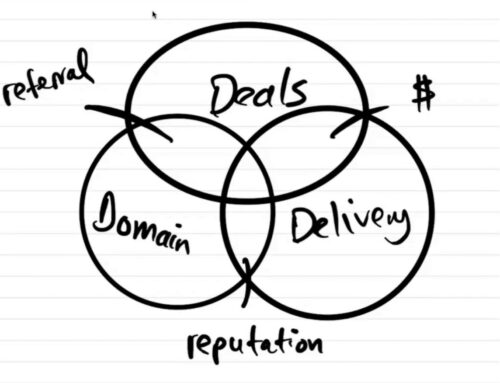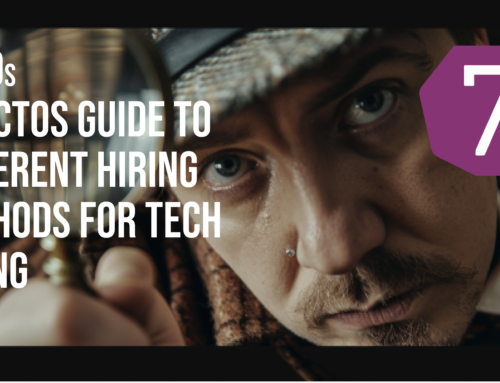Ep.116 What is it that CTOs need to know about Infrastructure trends?
Are you a technology professional looking to connect with like minded people?
We have a thriving community of CTOs discussing these episodes and more.
Click HERE to set up a call and learn more about becoming a member.
About The Speaker:
 Jonathan LaCour, CTO of Mission. Mission is an AWS partner providing DevOps services and my go to friends for infrastructure questions.
Jonathan LaCour, CTO of Mission. Mission is an AWS partner providing DevOps services and my go to friends for infrastructure questions.
Episode Resources:
Check out https://7ctos.com/
Episode Transcription:
Nickolai Walker: [00:00:13] Hello, hello and welcome back to the studio. I, of course, am your host, Nickolai Walker. We are joined in studio today by guest, Jonathan LaCour. He is the CTO at Mission. Mission is an AWS premier consulting partner. Now, I’m going to throw this over to Etienne to have him ask the question. But today, what we’re essentially going to be discussing is: what is it that CTOs need to know about infrastructure trends? But Etienne is going to say this a whole lot better than I am, so Etienne, take it away please.
Etienne de Bruin: [00:00:41] So my concern, at this moment as the CEO of a company, is what am I not doing? Well, what do I don’t know that I don’t know. You’re talking about trends and changes and all that’s going on right now, and notwithstanding the pandemic. But, you know, things are humming along every now and again. We run out of disk space as an example. Oh, we have to quickly work on the stuff. I’m assuming that is the worst possible way to go about your infrastructure. So I just have this feeling of unease, like how do I know what I’m not looking at and what I should be looking at and I should be bringing in a dev ops company or I should be leaving this up to the professionals versus sending everyone for a certification. And, you know, am I going the auto scaling route or am I going the Kubernetes route? So how do I, as a CTO, know that I’m not doing this wrong?
Jonathan LaCour: [00:01:58] I think that’s a great question, like how is that not on the mind of every single CTO in the world? I definitely struggle with that, too. And to me, the thing that always gives me comfort as a CTO is when I feel like I’m proactive and in control, when I’m having to be reactive most of the time in my behavior. So I’m seeing disk alerts, discs fill up and having to react and go and resolve. Or I’m running out of infrastructure resources available and I’m having to manually scale things up. These are things that I don’t want to have to be doing because it keeps me up at night. It distracts my mind from all sorts of things that I should be thinking about, like how can I maximize this business opportunity that I have? I’ve got a great product. I’ve got good product market fit. I don’t want to be fighting battles for things that should just be handled. Am I following best practices? And the challenge with that is there’s so much to fit in your head and it’s really hard to to be able to handle it all. There’s too many things to consider. So that’s why I do think it’s been really exciting for me to be in the partner space, as a technology partner to companies that are struggling with this. At the end of the day, I love nothing more than consulting with companies and helping them understand technology and how to best leverage it for their needs. And so, you know, having a trusted advisor and that doesn’t have to be a company like Mission, it can be, you know if you’re a very small business and you can’t afford to bring on a full time CTO, get a fractional CTO, right? If you have a CTO, but they’re very busy running the product, kind of an engineering organization, work with a partner or hire. You have to make an investment somewhere though.
Etienne de Bruin: [00:03:46] Yeah, I know. I get that. I think generally there’s an unease in my mind when things are just humming along. It’s like, what do I don’t know is actually going on. So are there some trends that you can think of or share with me on sort of what you’re noticing. Especially as you as a company, have had to adjust. Are there some things happening in the infrastructure land that you’re noticing as an important thing for people to maybe know?
Jonathan LaCour: [00:04:25] Yeah, a couple trends that are happening and a lot of it does relate back to Covid and everyone gets exhausted of talking about it over and over again. And that’s fine. But, these pressures that are created, they’re real. And we do have to react to them. And so some trends that I’m seeing is we’re seeing a big uptick in migrations. So people are saying, okay, I was putting off on migrating out of my on prem environment and moving into the cloud. But, maybe they have a hardware renewal coming up. They have to refresh all of their their gear and that’s going to be a big capital expense. Now’s a good time to make that investment and to move from, you know, these big CapEx expenses to an OpEx model transitioning and migrating to AWS. So we’re seeing a lot of that. We’re also seeing people really discovering very quickly that I didn’t really have a handle on my costs. I thought I did. But now I’m being asked by my investors or, you know, just by my accounting and finance team to reduce costs. I have to cut 15 percent of cost or I’m gonna have to let some people go. And so that’s a huge trend right now as well, which is why we really leaned into our cost optimization services earlier in the year. It’s like this is what companies need right now.
Jonathan LaCour: [00:05:45] We have the expertise. Let’s offer it to him and get them a fix as quickly as possible. So those are two big trends. And then I think the third big trend are architectures that are designed to reduce overall operational expense to drive efficiency. And those re-architecture, those things, like containerization is a big thing that’s happening right now. So companies are saying okay, I’ve got maybe a legacy architecture or, you know, I’m not taking full advantage of all the technology that’s available to me. Maybe if I can containerize my application busted up, maybe move from a monolith into micro services. I can more independently scale these things. I can have teams that are smaller and more dedicated. And so we’re seeing a lot of that as well, projects around containerization. So those are probably the three biggest things. Oh, and then other things in that same bucket with the containerization are things like adopting RDS and so maybe they have a self managed database and they’re like, why am I wasting my time doing this? I don’t want to have a DBA on staff spending all their time monitoring and managing my sequel cluster. Just turn on RDS. Point to the end point. Let AWS handle it for you. Same thing with all their other managed services. ElastiCache and, you know, I could go on and on, but moving to manage services.
Etienne de Bruin: [00:07:11] Yeah and I think one of the things, if we talk about the brutally early startups, i.e., you know, let’s just define them as two million ARR and below. That’s not brutally early, but that’s still pretty small. I think that there’s this constant struggle with the CTO to want to do things themselves and having to understand everything and why I’m such a huge fan of shifting to the experts even when it’s a bit uncomfortable or it feels a bit early is that you are nurturing that mindset that the specialists, the ones who eat, sleep and drink this kind of stuff will just provide you with 20x the type of knowledge and expertise then you buying AWS for dummies and saying, well, I’m the CTO, I should be doing this stuff or I should know this stuff.
Jonathan LaCour: [00:08:24] Yeah and it might be, it’s not always the wrong move for your team to become the experts on infrastructure. But it often isn’t. And I think that’s the biggest struggle. I’ve been CTO of a very small startup on several occasions. And when you are in that environment, you have significant constraints. And you have to look at, you know, the team that you have and say, okay, what are our core competencies? What are our unique differentiating skill sets that can set us apart? Everything else has to become not a focus. And you need to find a way to either make it something you either don’t do if it’s possible or be someone else does for you who is an expert. And most startups that we encounter now, there are a lot of them out there doing SAS applications and they’re building out, you know, products with very clear market needs. And they need to be really, really good at understanding their customer, understanding the problems that they’re facing and solving those problems for the customer. What the customer doesn’t care about is ‘how do you run your infrastructure?’ The customer cares that the application is up and running twenty four hours a day and it’s performant, right? And so, if you have limited investment, deploy that capital on things that are going to matter the most to your customer and the things that you can be uniquely differentiated in and that you have the skill sets they handle. And that’s why it’s okay. You can’t fit everything in your head anymore. It’s impossible, right? It’s okay to say I have a guy for that.
Nickolai Walker: [00:10:02] So as a New Yorker, I just want to say that I have been raised with that belief and I have been raised with that mantra. I always have a guy for anything I got to do.
Etienne de Bruin: [00:10:14] Yes. And I think such a critical function of the role of CTO is to decide what technology is the competitive advantage and what isn’t and work on building the moat around the competitive advantage. But please don’t do any work on the other stuff. And I think that’s kind of where I’m headed with that thinking.
Jonathan LaCour: [00:10:42] Yeah. And the most common mistake I’m seeing right now is people at very small startups becoming Kubernetes experts. That’s a huge mistake in my opinion. I’m not saying Kubernetes is bad. Kubernetes is fantastic, but it is big and it is complicated. And are you really adding value? Like there are other ways to solve this problem. A lot of times people can just do something a little bit simpler. They can use ECS or they can use EKS. . You don’t have to run your own Kubernetes cluster. Not every problem requires that huge sledgehammer of complexity. You might just be able to, you know, do things simpler.
Nickolai Walker: [00:11:26] Thanks again for joining us here in the studio, and thank you to Jonathan LaCour, who is the CTO at Mission. Mission is an AWS partner providing dev ops services and they are friends to go to when you need infrastructure questions answered, obviously. If you would, please, since you are enjoying this podcast, please subscribe to it in iTunes. Also, go check out Jonathan LaCour’s LinkedIn and do check out 7CTOs.com. Also check out missioncloud.com. And we’ll see you again with another interview with Mr. Jonathan LaCour.
Share This Story, Choose Your Platform!
Related Podcasts




